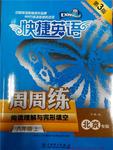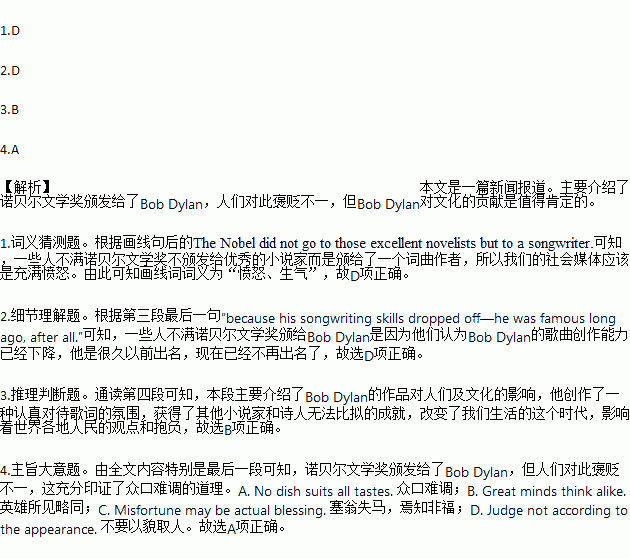题目内容
The Swedish Academy’s mid-October announcement regarding literature seldom fails to cause second-guessing.
Bob Dylan was awarded the big prize this morning, and my social media has been alive with indignation ever since. The Nobel did not go to those excellent novelists but to a songwriter. Some of those same people are still protesting that last year it was warded to Svetlana Alexievich, a “journalist”. They have decided, for whatever reasons, that song lyrics(歌词) are not literature.
And people are upset because Bob Dylan is the voice of some generation other than theirs, because he works in a popular style, because he does not work in this minute’s popular style, because he appeared on a car commercial that aired during the Super Bowl, because his songwriting skills dropped off — he was famous long ago, after all.
You may not think of Dylan as a poet, but Dylan created a climate in which lyrics were taken seriously. And Dylan accomplished something that few novelists or poets or for that matter songwriters have managed to do in our time: he changed the time he lived. Through words, with music, he affected the opinions and ambitions of hundreds of millions of people all over the world.The Nobel Prize in Literature cannot ever be all things to all people, and while this year’s award failed to accomplish various possible objectives, it was not in any way misapplied.
1.What does the underlined word “indignation” in Paragraph 2 probably mean?
A. Curiosity. B. Happiness.
C. Excitement. D. Anger.
2.Why are people upset about Dylan’s being awarded?
A. He failed to represent any generation.
B. He didn’t have good songwriting skills.
C. He played badly in the Super Bowl.
D. He is not popular any longer.
3.Paragraph 4 mainly focuses on Dylan’s _________.
A. style B. influence
C. efforts D. ambitions
4.Which can serve as the title of the passage?
A. No dish suits all tastes
B. Great minds think alike
C. Misfortune may be actual blessing
D. Judge not according to the appearance
 快捷英语周周练系列答案
快捷英语周周练系列答案


 dling away time 8. ( hurt ) him deeply, while if I have done something great and meaningful, such as 9. ( write ) a book, he will be more excited than me. I always remind 10. ( me ) I must go on and on, and never shall I give up halfway.
dling away time 8. ( hurt ) him deeply, while if I have done something great and meaningful, such as 9. ( write ) a book, he will be more excited than me. I always remind 10. ( me ) I must go on and on, and never shall I give up halfway.